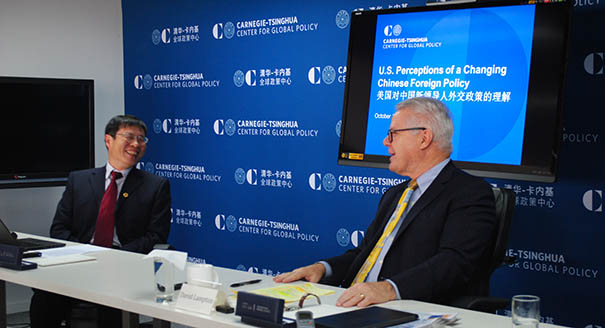Registration
You will receive an email confirming your registration.
China’s expanding overseas interests have led its leaders to become more engaged on global issues. Under President Xi Jinping’s leadership, Chinese diplomats have proposed the creation of a new international development bank, deployed troops and peacekeepers to conflict areas in Africa, and pledged to increase cooperation with Europe and the United States on combating terrorism in the Middle East. However, it remains to be seen how China can continue to abide by its traditional foreign policy principles of non-intervention and non-interference as it adopts a more active diplomatic strategy.
David Lampton presented his observations on the perceptions and reactions within the United States to recent changes in China’s foreign policy. Afterward Shi Zhiqin moderated a discussion. Zhao Kejin also made remarks.
Discussion Highlights
- U.S.-Sino Relations at Critical Juncture: Ties between Washington and Beijing have great potential for both collaborative opportunities and contentious pitfalls. Panelists asserted that current tensions are more sensitive and chronic than past, event-driven disagreements, because the former arise from competing interests that will not soon change. Burgeoning exchanges of goods and people form a basis for constructive engagement, panelists agreed, even as they conceded that simmering disagreements on maritime disputes and intellectual property rights remain unresolved.
- Acute Need for Strategic Leadership: The panelists stressed that the delicate nature of U.S.-Sino bilateral ties underscores a need for strategic vision and strong leadership. Based on their constructive Sunnylands dialogue in June 2013 and their recent summit during the November APEC meeting, President Barack Obama and President Xi Jinping’s relationship has a workable foundation. Panelists emphasized that Washington and Beijing need capable and responsive leadership at all levels of government to mitigate frictions and stabilize bilateral relations.
- Divergent U.S. Perceptions of China: The panelists noted that perceptions of China vary greatly between different segments of U.S. society. The business community traditionally has been a strong advocate of constructive, mutually beneficial bilateral relations, although disagreements on intellectual property remain. State and municipal U.S. officials have also been vital partners in deepening bilateral economic and investment ties. However, the closely contested November midterm elections motivated Congress members to criticize China so as to appear tough on foreign policy issues. Moreover, panelists conceded, PEW Center data suggests that perceptions of China among average U.S. citizens still has room for improvement.
- A Rising, Pluralizing China: Economic success and growing international stature has altered both China’s capabilities and citizens’ perceptions of the country’s global role. One panelist pointed out that as China continues to grow so to will the number of assertive stakeholders that seek to influence foreign and domestic policy formation. Consequently, more state organs and public opinion itself have begun affecting foreign policy in increasingly tangible ways. By way of illustration, panelists noted how many Chinese citizens view the United States as being in decline, a trend concurrent to China’s own rise, which increases pressure on the Chinese government to adopt a more assertive posture.
- Fostering Institutional Inclusiveness: Panelists asserted that the United States and other established powers should provide room in inclusive multilateral institutions to accommodate China’s expanding global role and interests. Beijing, Washington, and other state actors should engage proactively to forge stable collaborative ties. Although the United States initially decided not to include China in early Trans-Pacific Partnership negotiations, panelists maintained that this should not prevent Beijing from joining. Moreover, one panelist suggested that the new Asian Infrastructure Investment Bank has the potential to complement existing institutions, not necessarily compete with them. Both sides, panelists emphasized, should invest jointly in existing multilateral forums rather than separately in exclusionary ones.
David Lampton
David Lampton is George and Sadie Hyman professor and director of SAIS-China and China Studies at the Johns Hopkins School of Advanced International Studies. Prior to this appointment, he served as dean of faculty from 2004 to 2012. Formerly president of the National Committee on United States-China Relations, he is the author of many books and articles on Chinese politics and economy.
Shi Zhiqin
Shi Zhiqin is a resident scholar at the Carnegie–Tsinghua Center for Global Policy, where he runs the China-EU Relations program and the China-NATO dialogue series. Shi is also professor and chancellor of the School of Social Sciences and dean of the Department of International Relations at Tsinghua University.
Zhao Kejin
Zhao Kejin is a resident scholar at the Carnegie–Tsinghua Center and deputy director of Tsinghua’s center for U.S.-China relations. An expert on U.S. government and politics, comparative politics, political marketing, and Chinese diplomatic institutions, Zhao runs a program on China’s public diplomacy. Zhao is also an associate professor in the Institute of International Studies at Tsinghua University.
